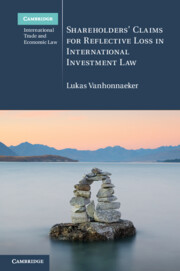Book contents
- Shareholders’ Claims for Reflective Loss in International Investment Law
- Cambridge International Trade and Economic Law
- Shareholders’ Claims for Reflective Loss in International Investment Law
- Copyright page
- Contents
- Figures
- Foreword
- Acknowledgments
- Table of Cases
- Table of Treaties
- Abbreviations and Acronyms
- Introduction: International Investment Law’s Narrative and Shareholders’ Claims for Reflective Loss
- 1 Shareholders in International Investment Law
- 2 International Investment Law’s Shareholders’ Claims for Reflective Loss: A Clash of Policies
- 3 Shareholders’ Claims for Reflective Loss in Domestic Regimes, Customary International Law of Diplomatic Protection, and Human Rights Law
- 4 International Investment Law on the Standing of Shareholders
- 5 Legal Uncertainty and Inconsistency Militating against Shareholders’ Claims for Reflective Loss: The Unpredictability of Investment Disputes Involving Shareholders
- 6 Shareholders’ Claims for Reflective Loss and the Dangers of Parallel Proceedings
- 7 International Res Judicata as a Solution to Parallel Proceedings Arising from Shareholders’ Claims for Reflective Loss in International Investment Law
- 8 The Consolidation of Proceedings and Mass Claims in International Investment Law and Arbitration
- 9 Calculating Damages in Shareholders’ Claims for Reflective Loss
- Conclusion
- Bibliography
- Index
2 - International Investment Law’s Shareholders’ Claims for Reflective Loss: A Clash of Policies
Published online by Cambridge University Press: 13 July 2020
- Shareholders’ Claims for Reflective Loss in International Investment Law
- Cambridge International Trade and Economic Law
- Shareholders’ Claims for Reflective Loss in International Investment Law
- Copyright page
- Contents
- Figures
- Foreword
- Acknowledgments
- Table of Cases
- Table of Treaties
- Abbreviations and Acronyms
- Introduction: International Investment Law’s Narrative and Shareholders’ Claims for Reflective Loss
- 1 Shareholders in International Investment Law
- 2 International Investment Law’s Shareholders’ Claims for Reflective Loss: A Clash of Policies
- 3 Shareholders’ Claims for Reflective Loss in Domestic Regimes, Customary International Law of Diplomatic Protection, and Human Rights Law
- 4 International Investment Law on the Standing of Shareholders
- 5 Legal Uncertainty and Inconsistency Militating against Shareholders’ Claims for Reflective Loss: The Unpredictability of Investment Disputes Involving Shareholders
- 6 Shareholders’ Claims for Reflective Loss and the Dangers of Parallel Proceedings
- 7 International Res Judicata as a Solution to Parallel Proceedings Arising from Shareholders’ Claims for Reflective Loss in International Investment Law
- 8 The Consolidation of Proceedings and Mass Claims in International Investment Law and Arbitration
- 9 Calculating Damages in Shareholders’ Claims for Reflective Loss
- Conclusion
- Bibliography
- Index
Summary
This chapter identifies the nature of shareholders’ claims for reflective loss, which entails addressing considerations of applicable law as well as the “clash of polices” undergirding them. This chapter starts by refuting the argument according to which the scope of shareholders’ rights in international investment law is defined by domestic law because the notion of “share” in international investment treaties must be understood by reference to municipal law. Contrary to this argument, this chapter explains that the notion of “share” as provided in international investment agreements must be interpreted in accordance with principles of interpretation of international law and must be understood in the specific context of international investment law that shares a different narrative than domestic law. This chapter further clarifies the nature of shareholders’ claims for reflective loss, which are direct claims brought by shareholders for their own and personal loss caused indirectly to their own investment (shares), and they do so by virtue of their own rights conferred upon them by the applicable investment agreement. This chapter then summarizes the main policy considerations that weigh against and in favor of shareholders’ claims for reflective loss in the specific context of international investment law.
Keywords
- Type
- Chapter
- Information
- Publisher: Cambridge University PressPrint publication year: 2020

